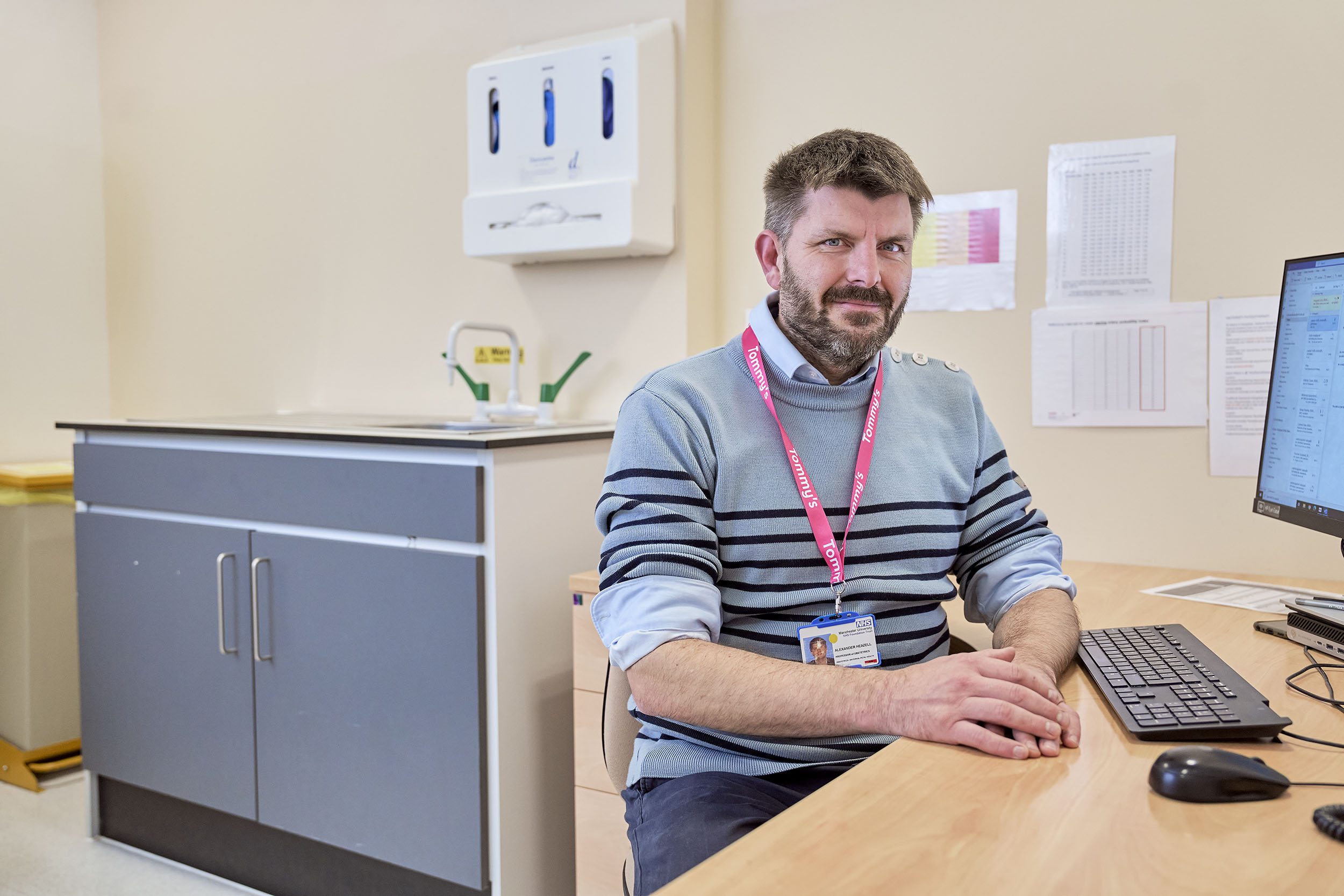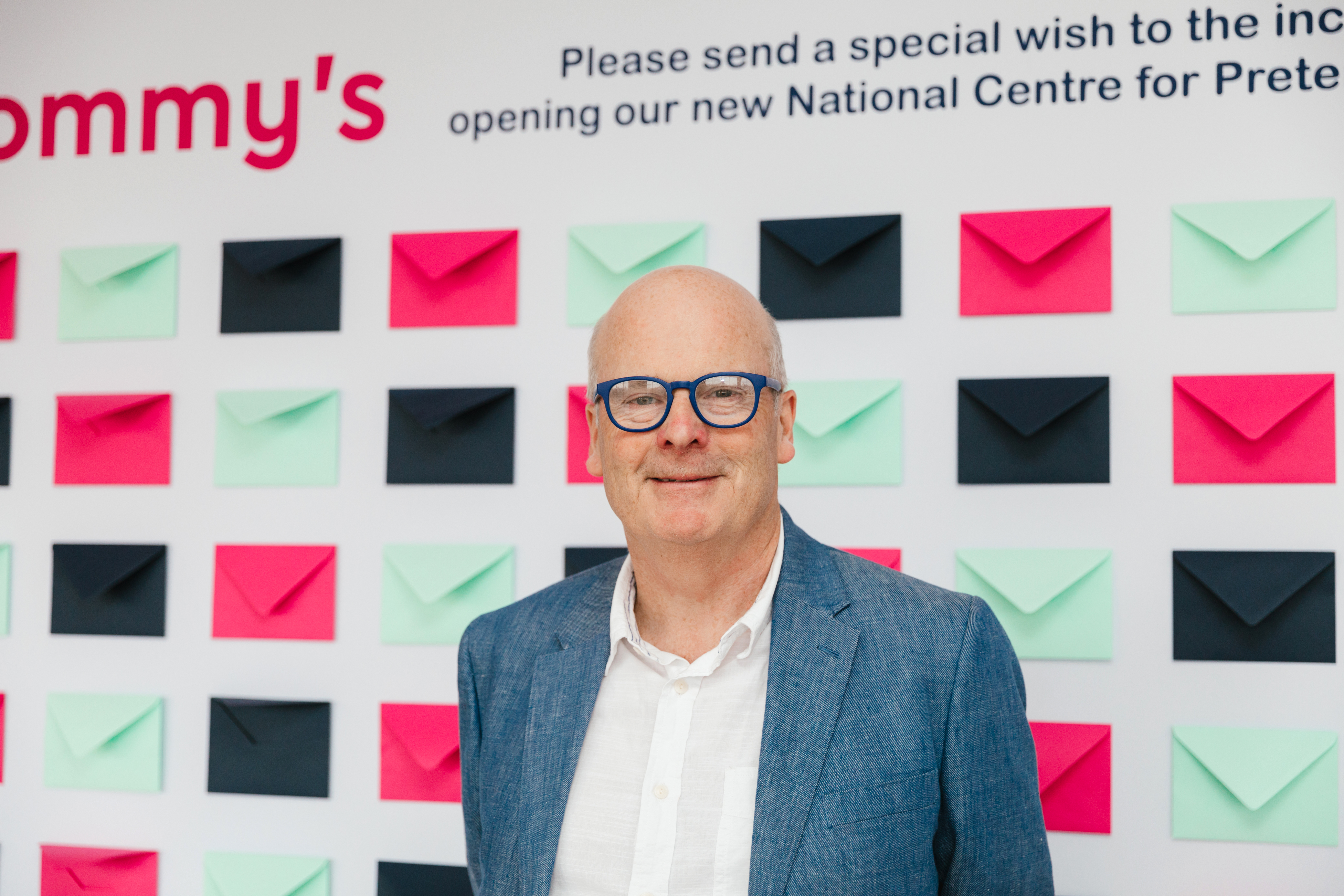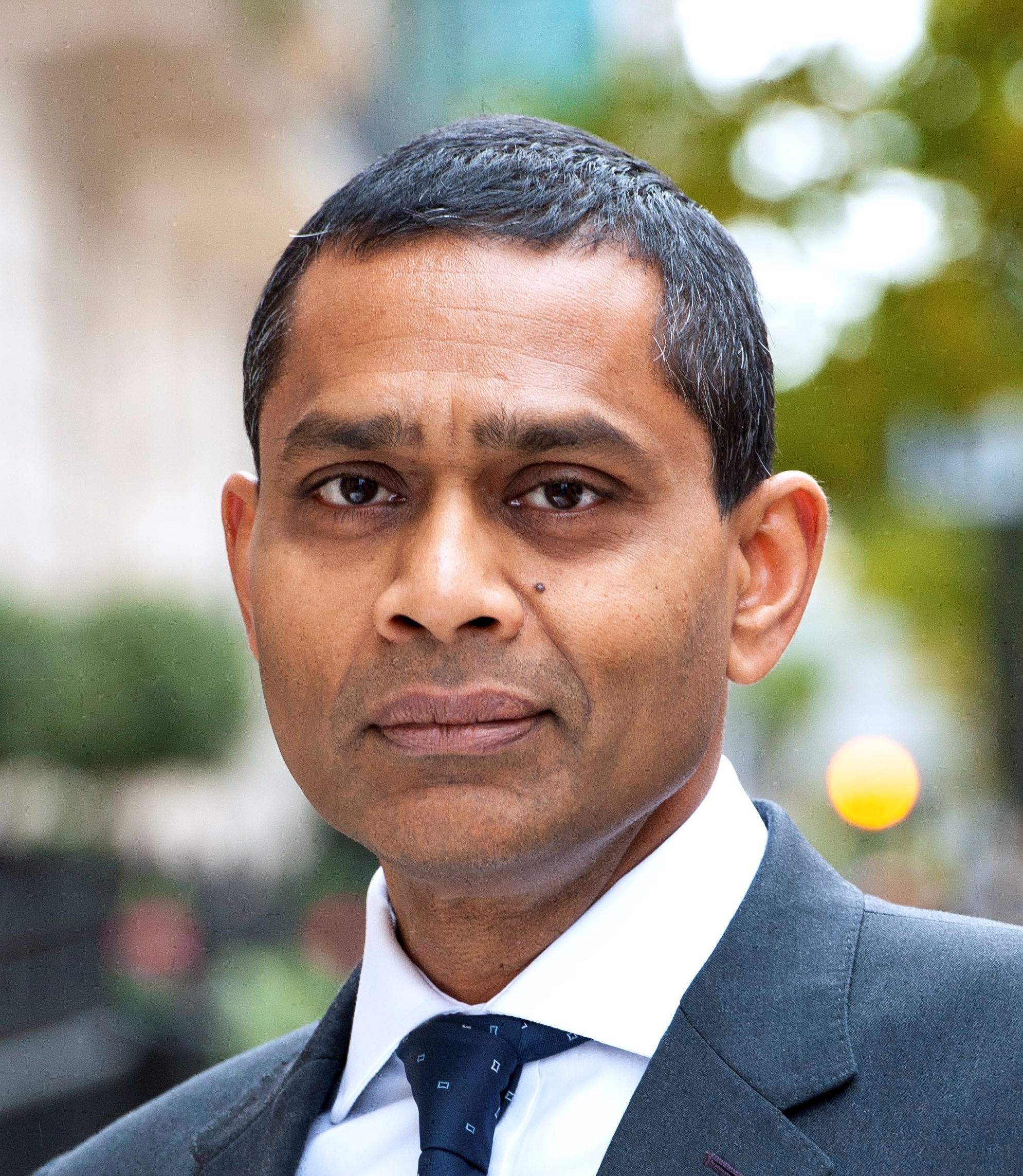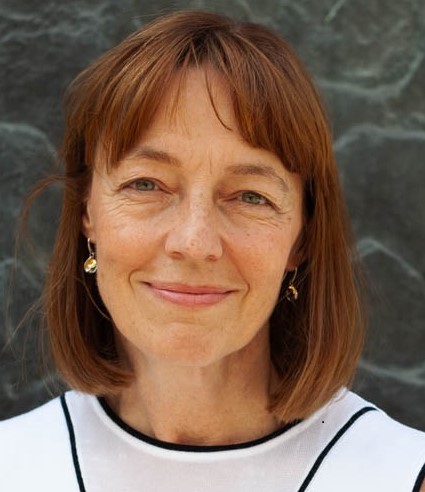Our research experts
Professor Alex Heazell, Director of Tommy's Maternal and Fetal Health Research Centre

Alex leads our Maternal and Fetal Health Research Centre at the University of Manchester, where he is Professor of Obstetrics. With midwifery colleagues, he established our pioneering Rainbow Clinic at St Mary’s Hospital, which has reduced the stillbirth rate in Greater Manchester by 32% since 2010 (against a much lower national average rate of reduction).
For many years, there was a sense of fatalism about stillbirth; it was just seen as ‘one of those things’, no one asked why. That left us starting from basics, so stillbirth research has a lot of catching up to do in comparison with other areas of medicine and even other pregnancy complications. I feel very fortunate to be able to combine my clinical work, looking after families in a speciality I care deeply about, with research that will hopefully improve outcomes for them. In a way, the taboo around stillbirth is similar to that surrounding cancer 50 years ago - without discussion of signs and symptoms, however small the chances were of developing it, people didn’t come forward early enough to save lives. Lifting that taboo is critical."
Prof Heazell’s main research interests are the placenta problems that can lead to stillbirth and how we can predict them, but he also studies maternal health conditions that can raise stillbirth risk such as diabetes and lupus. We’ve been funding his award-winning research since his PhD on pre-eclampsia in 2008, during which time he’s published more than 200 papers. In 2015, he led the UK’s Stillbirth Priority Setting Partnership and he is currently part of the lifesaving MBRRACE-UK consortium working to save mothers’ and babies’ lives.
Professor Andrew Shennan OBE, Tommy's Chair of Maternal and Fetal Health at King's College London

Andrew is Professor of Obstetrics at King's College London and a Consultant Obstetrician at Guy’s and St Thomas’ Hospital, where he leads the Preterm Birth Surveillance Clinic. As well as being Tommy's Chair of Maternal and Fetal Health, he is the King's lead for Tommy's National Centre for Preterm Birth Research. In 2018, he was made an OBE (Officer of the Order of the British Empire) for his tireless work in maternity services.
I really enjoy working with my patients; making a difference to them is the reason why we do this. It’s also really satisfying having undergraduate and PhD students, because you’re able to nurture the next generation of researchers who will have an impact on the future population. Helping others to realise their potential is truly worthwhile."
Prof Shennan led the development of the award-winning QUIPP app to predict and prevent premature birth, which is now being rolled out within the Tommy’s Pathway clinical decision support tool, and in 2017 he won the Newton Prize for his life-saving blood pressure monitoring CRADLE device. As well as his expertise in premature birth, his research portfolio includes pregnancy complications related to blood pressure such as pre-eclampsia, and he has published more than 200 peer-reviewed papers. He was previously Chair of the FIGO Preterm Birth Committee and currently sits on the academic and research committees of the Royal College of Obstetricians & Gynaecologists.
Professor Arri Coomarasamy OBE, Director of Tommy’s National Centre for Miscarriage Research

Arri leads our National Centre for Miscarriage Research, a unique partnership between the University of Birmingham (where he is Professor of Gynaecology and Reproductive Medicine), Imperial College London and the University of Warwick. He also directs the centre’s network of specialist research clinics, where people who have experienced recurrent miscarriage can take part in trials to access cutting-edge tests and treatments aiming to prevent more losses.
Miscarriage is a common but deeply personal and often isolating experience for many couples, and we are just beginning to provide clear evidence on the widescale devastation it causes. When I see people who’ve had a miscarriage, they generally have two questions: why did it happen, and how can we stop it happening again? Unfortunately, doctors don’t always know the answers – but with our world class team here determined to make a difference, we aim to understand the causes of miscarriage and find ways to prevent it. Tommy's investment in our work is the best thing that has happened to miscarriage research; it will change many lives."
Prof Coomarasamy works to influence miscarriage care guidelines so more people can benefit from the results of his team’s groundbreaking research, such as the PROMISE and PRISM trials using progesterone to prevent recurrent miscarriage in women with early pregnancy bleeding, and the MifeMiso project to improve medical management of missed miscarriage. He’s published more than 190 research articles and 5 medical textbooks, including an award-winning book on assisted conception treatment, and he serves on national and international committees aiming to make pregnancy safer for all.
Professor Basky Thilaganathan, Director of Tommy's National Centre for Maternity Improvement

Basky heads up Tommy's National Centre for Maternity Improvement, working to tackle inequities in maternity care and make the UK the safest place in the world to give birth. His expertise includes twin pregnancies, placenta function and pregnancy complications such as pre-eclampsia and fetal growth restriction. He has experience developing and implementing pioneering tools to personalise care and improve pregnancy outcomes, making him ideally placed to lead the centre’s work.
The digital tool we are developing will use the latest technology and insights, and incorporate best practice care guidelines, to help improve and standardise care across the NHS. Through its intelligent risk assessment process and personalisation of care recommendations for each woman, this tool could help prevent up to 600 stillbirths and 12,000 premature births in the UK every year. By ending current inequalities in care where some women receive too much – and often unnecessary – care while others get too little, more babies’ lives will be saved."
Prof Thilaganathan is Director of Fetal Medicine and Consultant Obstetrician at St George’s University Hospital in London, where he leads the training programme for other clinicians to become specialists in his field. In 2007, he was made a Fellow of the Royal College of Obstetricians & Gynaecologists, which he represents on the UK National Screening Committee. He has authored more than 250 peer-reviewed publications and was previously editor-in-chief of medical journal Ultrasound in Obstetrics & Gynaecology.
Professor Catherine Williamson, Director of Tommy’s National Centre for Preterm Birth Research

Cath is based at Imperial College London, where she heads up Tommy's National Centre for Preterm Birth Research. She is Professor of Women’s Health and is an Honorary Consultant in Obstetric Medicine at Queen Charlotte’s, St Thomas’ and King’s College Hospitals. She has an international reputation for her work on metabolic disorders of pregnancy, in particular relating to cholestasis, where she has conducted research that’s had a major impact on clinical practice. This includes research to understand the cause of premature birth and stillbirth in cholestasis and evaluation of drugs to prevent these devastating complications of pregnancy. In her clinical practice, she manages women with medical disorders in pregnancy.
It is a privilege to be Director of the Tommy’s National Centre for Preterm Birth Research. By bringing leading researchers in the field together to pursue ambitious, collaborative projects, we aim to make a big impact on our understanding of the causes of preterm birth and to use this knowledge to design better treatments.
Prof Williamson has an outstanding track record of developing future research leaders. She has supervised 20 PhD students and MD students and has mentored and supported junior academics through Academic Training Fellowships. She has worked closely with both industry and policy professionals and is also experienced in public engagement activities.
Some of our other leading clinicians and scientists
Professor Phillip Bennett, Imperial College London
Professor Phillip Bennett is Director of the Institute for Reproductive and Developmental Biology at Imperial College London, one of the largest women’s health research facilities in Europe. He is also the Imperial lead for Tommy's National Centre for Miscarriage Research and Tommy's National Centre for Preterm Birth Research. He has an international reputation for research into complications of pregnancy and has worked for over 30 years to improve the health of pregnant women, birthing people and their babies through research into a range of areas including miscarriage, fetal growth restriction and premature birth.
Professor Jan Brosens, University of Warwick
Professor Jan Brosens is Professor of Obstetrics and Gynaecology at the University of Warwick, where he is also the Scientific Director of Tommy’s National Centre for Miscarriage Research. Jan’s research centres on the human endometrium (the womb lining) in the context of miscarriage, infertility, endometriosis and endometrial cancer. His major translational interest is focused on improving the management of miscarriage, the most common complication of pregnancy. Jan is also the Deputy Head of the Division of Biomedical Sciences at Warwick Medical School.
Dr Lizzy Cottrell, University of Manchester
Dr Lizzy Cottrell is a physiologist by training and is one of the Scientific Directors of Tommy’s Maternal and Fetal Health Research Centre in Manchester. She is a Lecturer in Maternal and Fetal Health and is also Scientific Lead for cardiovascular research studies in the Maternal and Fetal Health Research Centre. Her major research aim is to identify therapies or interventions that will improve pregnancy outcomes and lifelong health.
Professor Anna David, University College London
Professor Anna David is Deputy Director of Tommy’s National Centre for Preterm Birth Research. She is Professor and Director of the Elizabeth Garrett Anderson Institute for Women’s Health at UCL and is an Honorary Consultant in Obstetrics/Maternal Fetal Medicine at UCL Hospitals NHS Foundation Trust (UCLH). Anna co-leads the preterm birth clinical service at UCLH, which she launched in 2008, and she leads the North Central London Preterm Birth Network. Her research focuses on improving the diagnosis and treatment of women and birthing people at risk of premature birth and she has more than 270 publications to her name. Professor David has been recognised for her academic mentorship, both at UCL and nationally.
Dr Lucy Higgins, University of Manchester
Dr Lucy Higgins is a Senior Clinical Lecturer in Obstetrics and Clinical Director of the Tommy’s Maternal and Fetal Health Research Centre in Manchester. Lucy is a clinician-scientist whose primary research interests are the prediction, identification and treatment of placental dysfunction, including fetal growth restriction, pre-eclampsia and stillbirth. She is the chief investigator and clinical lead of the START clinic – a clinic to support women and birthing people who have conceived by assisted reproductive technology.
Professor Andy Judge, University of Bristol
Professor Andy Judge is Deputy Director of Tommy's National Centre for Maternity Improvement and is a Professor of Translational Statistics at the University of Bristol. He has expertise in medical statistics and in conducting epidemiological research across multiple health conditions using ‘big’ health registry data. He is currently working as Data and Statistical Analysis Lead at the Tommy’s National Centre for Maternity Improvement. He is also part of the Bristol NIHR Biomedical Research Centre and his current research is focused on health service delivery – exploring variation in the way hospitals treat and manage patients, and in understanding the best models of care to improve patient outcomes.
Professor Siobhan Quenby, University of Warwick
Professor Siobhan Quenby is Professor of Obstetrics and Honorary Consultant at University Hospitals Coventry & Warwickshire and the University of Warwick. She is also the Warwick lead for Tommy's National Centre for Miscarriage Research. She is clinically active as part of the obstetric team and runs specialist clinics dedicated to the management and research of recurrent pregnancy loss prevention. She has over 20 years of experience in research into implantation and recurrent miscarriage, and has published over 125 original articles and 22 chapters for academic books. Her work has received considerable media interest, including from national newspapers, BBC radio and television.
Professor Jane Sandall CBE, King's College London
Professor Jane Sandall is Deputy Director of Tommy's National Centre for Maternity Improvement. She is a Professor of Social Science and Women’s Health at King’s College London. She has a clinical background in midwifery and an academic background in social science. She has experience in implementation science and collaborative cross-boundary leadership, and her research is focused on the safety and quality of maternity care, including birth outcomes in different settings, maternity workforce skill mix and engagement by patients and families in their own safety.
Dr Nigel Simpson, University of Leeds
Dr Nigel Simpson is the University of Leeds lead for Tommy’s National Centre for Preterm Birth Research. He is a Senior Clinical Lecturer and Consultant in Obstetrics and Gynaecology at the University of Leeds and the Leeds Teaching Hospitals NHS Trust. He has extensive clinical expertise in the prediction and prevention of pregnancy complications such as pre-eclampsia, fetal growth restriction and premature birth, and runs one of the longest-standing and largest premature birth prevention services in the country.
Professor Steve Thornton, Queen Mary University of London
Professor Steve Thornton is the QMUL lead for Tommy’s National Centre for Preterm Birth Research. He is Professor of Obstetrics at QMUL and is a Consultant at Barts Health NHS Trust. He has a long-standing interest in understanding how labour happens, both prematurely and at term. He has published more than 100 peer-reviewed papers in high quality journals and has a long history of mentoring non-clinical and clinical scientists, many of whom have gone on to produce major findings related to premature birth. He has held key leadership roles in obstetrics for the Royal College of Obstetricians & Gynaecologists and developed an international group for the coordination and delivery of clinical trials in obstetrics.
Find out more about our people
-
Read more about 'Tommy's Midwives'
Tommy's Midwives
At Tommy's we have a team of in-house midwives who guide our Pregnancy Information Service and respond to queries from pregnant women and birthing people. -
Read more about 'Our Research Review Group'
Our Research Review Group
Meet our Research Review Group - the experts who complete the peer review process of the Tommy's research centre activities. -
Read more about 'Our Senior Leadership Team'
Our Senior Leadership Team
Meet our Chief Exec and Senior Leadership Team who oversee operations, fundraising, marketing, information, policy and research.
